Shireen Kudukkil Manchingal
Uncertainty-Aware Autonomous Vehicles: Predicting the Road Ahead
Oct 26, 2025Abstract:Autonomous Vehicle (AV) perception systems have advanced rapidly in recent years, providing vehicles with the ability to accurately interpret their environment. Perception systems remain susceptible to errors caused by overly-confident predictions in the case of rare events or out-of-sample data. This study equips an autonomous vehicle with the ability to 'know when it is uncertain', using an uncertainty-aware image classifier as part of the AV software stack. Specifically, the study exploits the ability of Random-Set Neural Networks (RS-NNs) to explicitly quantify prediction uncertainty. Unlike traditional CNNs or Bayesian methods, RS-NNs predict belief functions over sets of classes, allowing the system to identify and signal uncertainty clearly in novel or ambiguous scenarios. The system is tested in a real-world autonomous racing vehicle software stack, with the RS-NN classifying the layout of the road ahead and providing the associated uncertainty of the prediction. Performance of the RS-NN under a range of road conditions is compared against traditional CNN and Bayesian neural networks, with the RS-NN achieving significantly higher accuracy and superior uncertainty calibration. This integration of RS-NNs into Robot Operating System (ROS)-based vehicle control pipeline demonstrates that predictive uncertainty can dynamically modulate vehicle speed, maintaining high-speed performance under confident predictions while proactively improving safety through speed reductions in uncertain scenarios. These results demonstrate the potential of uncertainty-aware neural networks - in particular RS-NNs - as a practical solution for safer and more robust autonomous driving.
Position: Epistemic Artificial Intelligence is Essential for Machine Learning Models to Know When They Do Not Know
May 08, 2025



Abstract:Despite the impressive achievements of AI, including advancements in generative models and large language models, there remains a significant gap in the ability of AI to handle uncertainty and generalize beyond the training data. We argue that AI models, especially in autonomous systems, fail to make robust predictions when faced with unfamiliar or adversarial data, as evidenced by incidents with autonomous vehicles. Traditional machine learning approaches struggle to address these issues due to an overemphasis on data fitting and domain adaptation. This position paper posits a paradigm shift towards epistemic artificial intelligence, emphasizing the need for models to learn not only from what they know but also from their ignorance. This approach, which focuses on recognizing and managing uncertainty, offers a potential solution to improve the resilience and robustness of AI systems, ensuring that they can better handle unpredictable real-world environments.
Epistemic Wrapping for Uncertainty Quantification
May 04, 2025Abstract:Uncertainty estimation is pivotal in machine learning, especially for classification tasks, as it improves the robustness and reliability of models. We introduce a novel `Epistemic Wrapping' methodology aimed at improving uncertainty estimation in classification. Our approach uses Bayesian Neural Networks (BNNs) as a baseline and transforms their outputs into belief function posteriors, effectively capturing epistemic uncertainty and offering an efficient and general methodology for uncertainty quantification. Comprehensive experiments employing a Bayesian Neural Network (BNN) baseline and an Interval Neural Network for inference on the MNIST, Fashion-MNIST, CIFAR-10 and CIFAR-100 datasets demonstrate that our Epistemic Wrapper significantly enhances generalisation and uncertainty quantification.
Random-Set Large Language Models
Apr 25, 2025Abstract:Large Language Models (LLMs) are known to produce very high-quality tests and responses to our queries. But how much can we trust this generated text? In this paper, we study the problem of uncertainty quantification in LLMs. We propose a novel Random-Set Large Language Model (RSLLM) approach which predicts finite random sets (belief functions) over the token space, rather than probability vectors as in classical LLMs. In order to allow so efficiently, we also present a methodology based on hierarchical clustering to extract and use a budget of "focal" subsets of tokens upon which the belief prediction is defined, rather than using all possible collections of tokens, making the method scalable yet effective. RS-LLMs encode the epistemic uncertainty induced in their generation process by the size and diversity of its training set via the size of the credal sets associated with the predicted belief functions. The proposed approach is evaluated on CoQA and OBQA datasets using Llama2-7b, Mistral-7b and Phi-2 models and is shown to outperform the standard model in both datasets in terms of correctness of answer while also showing potential in estimating the second level uncertainty in its predictions and providing the capability to detect when its hallucinating.
A Unified Evaluation Framework for Epistemic Predictions
Jan 28, 2025Abstract:Predictions of uncertainty-aware models are diverse, ranging from single point estimates (often averaged over prediction samples) to predictive distributions, to set-valued or credal-set representations. We propose a novel unified evaluation framework for uncertainty-aware classifiers, applicable to a wide range of model classes, which allows users to tailor the trade-off between accuracy and precision of predictions via a suitably designed performance metric. This makes possible the selection of the most suitable model for a particular real-world application as a function of the desired trade-off. Our experiments, concerning Bayesian, ensemble, evidential, deterministic, credal and belief function classifiers on the CIFAR-10, MNIST and CIFAR-100 datasets, show that the metric behaves as desired.
CreINNs: Credal-Set Interval Neural Networks for Uncertainty Estimation in Classification Tasks
Jan 10, 2024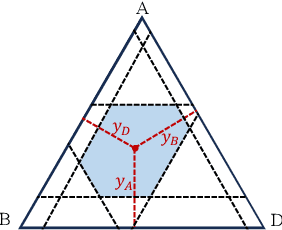
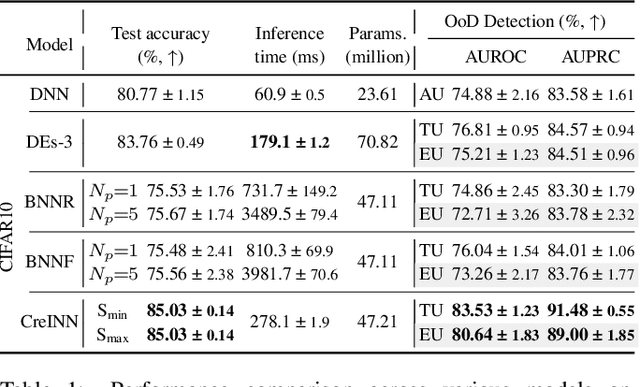
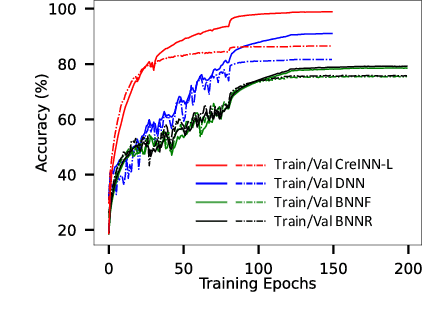

Abstract:Uncertainty estimation is increasingly attractive for improving the reliability of neural networks. In this work, we present novel credal-set interval neural networks (CreINNs) designed for classification tasks. CreINNs preserve the traditional interval neural network structure, capturing weight uncertainty through deterministic intervals, while forecasting credal sets using the mathematical framework of probability intervals. Experimental validations on an out-of-distribution detection benchmark (CIFAR10 vs SVHN) showcase that CreINNs outperform epistemic uncertainty estimation when compared to variational Bayesian neural networks (BNNs) and deep ensembles (DEs). Furthermore, CreINNs exhibit a notable reduction in computational complexity compared to variational BNNs and demonstrate smaller model sizes than DEs.
Random-Set Convolutional Neural Network (RS-CNN) for Epistemic Deep Learning
Jul 11, 2023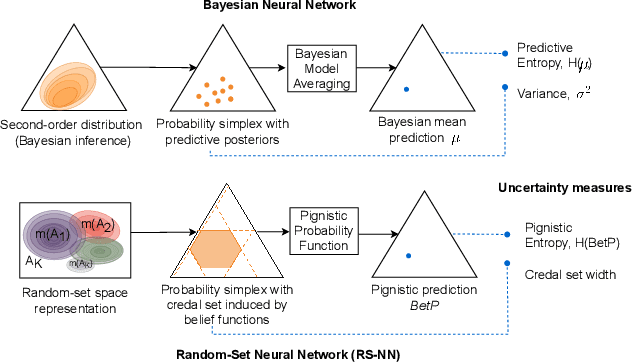
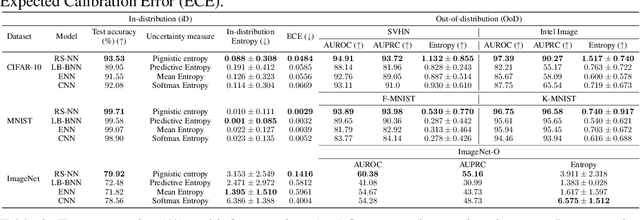


Abstract:Machine learning is increasingly deployed in safety-critical domains where robustness against adversarial attacks is crucial and erroneous predictions could lead to potentially catastrophic consequences. This highlights the need for learning systems to be equipped with the means to determine a model's confidence in its prediction and the epistemic uncertainty associated with it, 'to know when a model does not know'. In this paper, we propose a novel Random-Set Convolutional Neural Network (RS-CNN) for classification which predicts belief functions rather than probability vectors over the set of classes, using the mathematics of random sets, i.e., distributions over the power set of the sample space. Based on the epistemic deep learning approach, random-set models are capable of representing the 'epistemic' uncertainty induced in machine learning by limited training sets. We estimate epistemic uncertainty by approximating the size of credal sets associated with the predicted belief functions, and experimentally demonstrate how our approach outperforms competing uncertainty-aware approaches in a classical evaluation setting. The performance of RS-CNN is best demonstrated on OOD samples where it manages to capture the true prediction while standard CNNs fail.
Epistemic Deep Learning
Jun 15, 2022

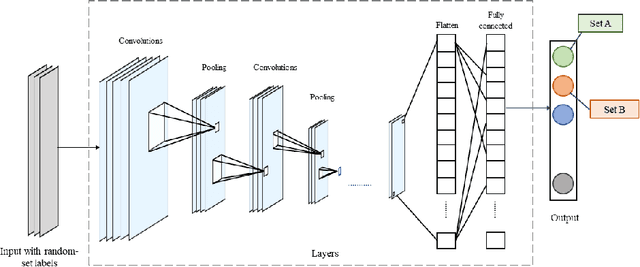
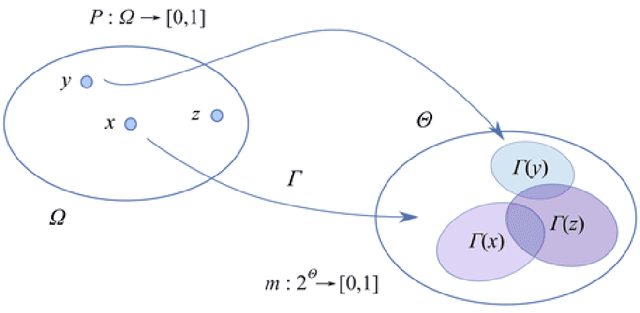
Abstract:The belief function approach to uncertainty quantification as proposed in the Demspter-Shafer theory of evidence is established upon the general mathematical models for set-valued observations, called random sets. Set-valued predictions are the most natural representations of uncertainty in machine learning. In this paper, we introduce a concept called epistemic deep learning based on the random-set interpretation of belief functions to model epistemic learning in deep neural networks. We propose a novel random-set convolutional neural network for classification that produces scores for sets of classes by learning set-valued ground truth representations. We evaluate different formulations of entropy and distance measures for belief functions as viable loss functions for these random-set networks. We also discuss methods for evaluating the quality of epistemic predictions and the performance of epistemic random-set neural networks. We demonstrate through experiments that the epistemic approach produces better performance results when compared to traditional approaches of estimating uncertainty.
 Add to Chrome
Add to Chrome Add to Firefox
Add to Firefox Add to Edge
Add to Edge